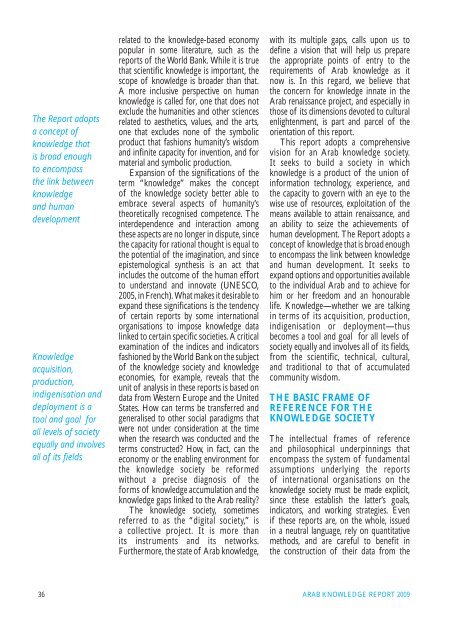Arab Knowledge Report 2009: Towards Productive
Arab Knowledge Report 2009: Towards Productive
Arab Knowledge Report 2009: Towards Productive
- No tags were found...
Create successful ePaper yourself
Turn your PDF publications into a flip-book with our unique Google optimized e-Paper software.
The <strong>Report</strong> adoptsa concept ofknowledge thatis broad enoughto encompassthe link betweenknowledgeand humandevelopment<strong>Knowledge</strong>acquisition,production,indigenisation anddeployment is atool and goal forall levels of societyequally and involvesall of its fieldsrelated to the knowledge-based economypopular in some literature, such as thereports of the World Bank. While it is truethat scientific knowledge is important, thescope of knowledge is broader than that.A more inclusive perspective on humanknowledge is called for, one that does notexclude the humanities and other sciencesrelated to aesthetics, values, and the arts,one that excludes none of the symbolicproduct that fashions humanity’s wisdomand infinite capacity for invention, and formaterial and symbolic production.Expansion of the significations of theterm “knowledge” makes the conceptof the knowledge society better able toembrace several aspects of humanity’stheoretically recognised competence. Theinterdependence and interaction amongthese aspects are no longer in dispute, sincethe capacity for rational thought is equal tothe potential of the imagination, and sinceepistemological synthesis is an act thatincludes the outcome of the human effortto understand and innovate (UNESCO,2005, in French). What makes it desirable toexpand these significations is the tendencyof certain reports by some internationalorganisations to impose knowledge datalinked to certain specific societies. A criticalexamination of the indices and indicatorsfashioned by the World Bank on the subjectof the knowledge society and knowledgeeconomies, for example, reveals that theunit of analysis in these reports is based ondata from Western Europe and the UnitedStates. How can terms be transferred andgeneralised to other social paradigms thatwere not under consideration at the timewhen the research was conducted and theterms constructed? How, in fact, can theeconomy or the enabling environment forthe knowledge society be reformedwithout a precise diagnosis of theforms of knowledge accumulation and theknowledge gaps linked to the <strong>Arab</strong> reality?The knowledge society, sometimesreferred to as the “digital society,” isa collective project. It is more thanits instruments and its networks.Furthermore, the state of <strong>Arab</strong> knowledge,with its multiple gaps, calls upon us todefine a vision that will help us preparethe appropriate points of entry to therequirements of <strong>Arab</strong> knowledge as itnow is. In this regard, we believe thatthe concern for knowledge innate in the<strong>Arab</strong> renaissance project, and especially inthose of its dimensions devoted to culturalenlightenment, is part and parcel of theorientation of this report.This report adopts a comprehensivevision for an <strong>Arab</strong> knowledge society.It seeks to build a society in whichknowledge is a product of the union ofinformation technology, experience, andthe capacity to govern with an eye to thewise use of resources, exploitation of themeans available to attain renaissance, andan ability to seize the achievements ofhuman development. The <strong>Report</strong> adopts aconcept of knowledge that is broad enoughto encompass the link between knowledgeand human development. It seeks toexpand options and opportunities availableto the individual <strong>Arab</strong> and to achieve forhim or her freedom and an honourablelife. <strong>Knowledge</strong>—whether we are talkingin terms of its acquisition, production,indigenisation or deployment—thusbecomes a tool and goal for all levels ofsociety equally and involves all of its fields,from the scientific, technical, cultural,and traditional to that of accumulatedcommunity wisdom.THE BASIC FRAME OFREFERENCE FOR THEKNOWLEDGE SOCIETYThe intellectual frames of referenceand philosophical underpinnings thatencompass the system of fundamentalassumptions underlying the reportsof international organisations on theknowledge society must be made explicit,since these establish the latter’s goals,indicators, and working strategies. Evenif these reports are, on the whole, issuedin a neutral language, rely on quantitativemethods, and are careful to benefit inthe construction of their data from the36 ARAB KNOWLEDGE REPORT <strong>2009</strong>
















